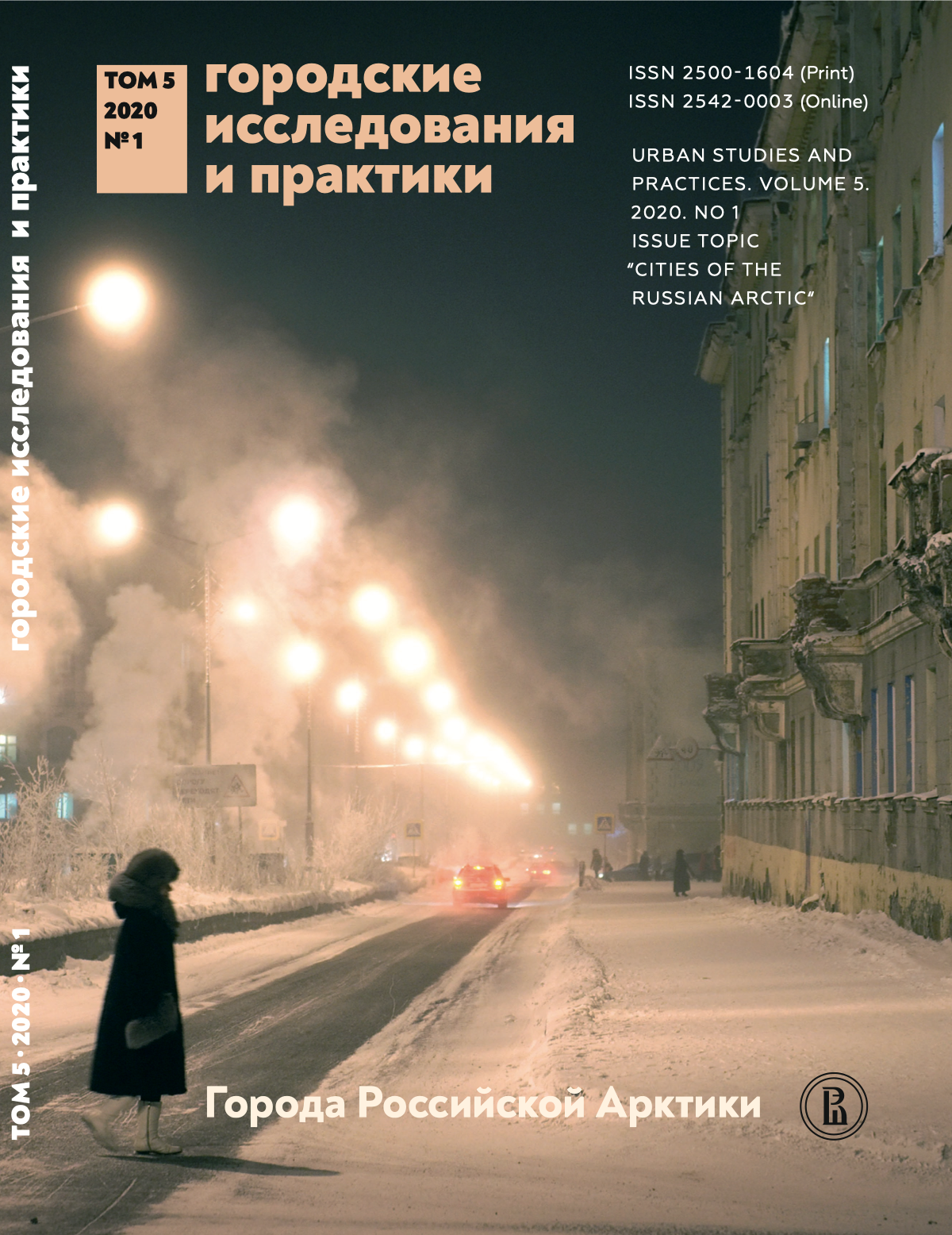Оценка механизмов управления вахтовой миграцией в регионах Арктической зоны России на примере Республики Саха (Якутия)
Аннотация
Для желаемого Россией освоения Арктической зоны (развития региональной инфраструктуры, увеличения добычи полезных ископаемых и объемов торговли) требуется значительный объем человеческого капитала, который арктические регионы сегодня не способны обеспечить самостоятельно. Этот спрос на территориях с низкой плотностью населения может удовлетворить вахтовая миграция — вид временной трудовой миграции на труднодоступные территории. Однако, во-первых, далеко не все политики, государственные служащие и ученые считают вахтовую миграцию подходящей моделью для развития территорий, а во-вторых, год от года растет количество упоминаемых в СМИ нарушений трудовых прав вахтовиков. Если нормативная правовая регламентация вахтовой миграции имеет лазейки, которые недобросовестные работодатели могут использовать для экономии на издержках, то расширение использования труда вахтовиков в Арктике способно привести к соответствующему росту количества нарушений прав вахтовых мигрантов.
Целью данной работы является оценка организации вахтовой миграции в регионах Арктической зоны России для предоставления рекомендаций по возможному усовершенствованию этого процесса со стороны государства. В качестве методов исследования используются обзор нормативной правовой документации, контент-анализ публикаций в СМИ и интервьюирование государственных служащих и научных сотрудников из Республики Саха (Якутия).
Результаты исследования помимо прочего подтвердили наличие пробелов в законодательстве по вахтовой миграции. Так, например, само понятие вахтовой миграции отсутствует в федеральных нормативных правовых актах, а вахтовый метод недостаточно разграничен с сезонными работами, регламентация которых менее подробна. Также на основе опыта управления вахтовой миграцией в Якутии был составлен ряд дополнительных рекомендаций, касающихся сочетания стационарной модели развития и вахтового метода. В частности, использование трехсторонних соглашений между регионом, муниципалитетом и компанией, которая желает вести свою деятельность на конкретной территории, а также проведение этнологических экспертиз может оказаться полезным для выстраивания отношений между местными жителями и бизнесом и в других субъектах Российской Федерации.
Скачивания
Литература
Годовой отчет о результатах деятельности АК «АЛРОСА» (ПАО) (2017) // Корпоративный сайт АК «АЛРОСА». Режим доступа: [http://www.alrosa.ru/wp-content/uploads/2018/06/180629_AR_AnnRep_01.pdf](http://www.alrosa.ru/wp-content/uploads/2018/06/180629_AR_AnnRep_01.pdf) (дата обращения: 07.05.2019).
Коллективный договор между АК «АЛРОСА» (ПАО) и Общественной организацией Межрегиональный профессиональный союз работников АК «АЛРОСА» (ПАО) «ПРОФАЛМАЗ» на 2017–2019 гг. (2017) // Официальный сайт «Межрегионального профессионального союза работников АК «АЛРОСА» (ПАО) «ПРОФАЛМАЗ». Режим доступа: [http://new.profalmaz.info/kollektivnyy-dogovor.html](http://new.profalmaz.info/kollektivnyy-dogovor.html) (дата обращения: 07.05.2019).
Крамар В.С., Силин А.Н. (2011) Центры экономического роста на Крайнем Севере и вахтовый метод // Проблемы Севера и Арктики Российской Федерации. No 13. С. 36–39.
Нуйкина Е.В. (2013) Влияние вахтового метода работы на принимающие города Российского Севера (на примере города Воркуты) // Известия Коми НЦ УрО РАН. No 14 (2). С. 107–116.
Осина К. (2016) Вахтовикам ЯНАО отказали в зарплатах. «В 90-х их бы закатали в асфальт» // Средство массовой информации «Правда УрФО». Режим доступа: [http://pravdaurfo.ru/comment/80344](http://pravdaurfo.ru/comment/80344) (дата обращения: 03.05.2019).
Пилясов А.Н., Замятина Н.Ю. (2019) Освоение Севера 2.0: вызовы формирования новой теории // Арктика и Север. No 34. С. 57–76.
Плюснин Ю.М., Заусаева Я.Д., Жидкевич Н.Н., Позаненко А.А. (2013) Отходники. М.: Новый Хронограф.
Подцероб М., Смертина П. (2018) Как вахтовики воюют с работодателями. И почему вахтовые поселки — подходящее место для трудовых конфликтов // Электронное периодическое издание «Ведомости». Режим доступа: [https://www.vedomosti.ru/management/articles/2018/11/21/787121-vahtoviki-voyuyut-s-rabotodatelyami](https://www.vedomosti.ru/management/articles/2018/11/21/787121-vahtoviki-voyuyut-s-rabotodatelyami) (дата обращения: 09.05.2019).
Постановление (1987) Постановление Госкомтруда СССР, Секретариата ВЦСПС, Минздрава СССР от 31.12.1987 г. N 794/33-82 (ред. от 17.01.1990, с изм. от 19.02.2003) «Об утверждении Основных положений о вахтовом методе организации работ».
Проект (2019) Проект «Стратегии социально-экономического развития Арктической зоны Республики Саха (Якутия) на период до 2030 года».
Распределение внутрироссийских трудовых мигрантов по видам экономической деятельности и по территориям места их основной работы (2017) // Официальный сайт «Федеральной службы государственной статистики». Режим доступа: [www.gks.ru/free_doc/new_site/population/trud/migrac/tab4_2017.xls](http://www.gks.ru/free_doc/new_site/population/trud/migrac/tab4_2017.xls) (дата обращения: 03.05.2019).
Регионы России. Основные характеристики субъектов Российской Федерации (2018) // Официальный сайт Федеральной службы государственной статистики. Режим доступа: [http://www.gks.ru/bgd/regl/b18_14s/Main.htm](http://www.gks.ru/bgd/regl/b18_14s/Main.htm) (дата обращения: 03.05.2019).
Рыбаковский Л.Л. (ред.) (2005) Практическая демография. М.: ЦСП.
Силин А.Н. (2015). Социологические аспекты вахтового труда на территориях севера Западной Сибири // Экономические и социальные перемены: факты, тенденции, прогноз. No 40 (4). С. 109–123.
Стратегия (2013) Стратегия развития Арктической зоны Российской Федерации и обеспечения национальной безопасности на период до 2020 года (утв. Президентом Российской Федерации 08.02.13 N Пр-232).
Сукнёва С.А. (2010) Миграционные процессы в северном регионе // Вестник Московского университета. Серия 6: Экономика. No 1. С. 74–84.
Трудовой кодекс (2019) «Трудовой кодекс Российской Федерации» от 30.12.2001 N 197-ФЗ (ред. от 01.04.2019).
Фатеев А. (2013) Дмитрий Кобылкин: «Отнять у России Арктику не получится» // Парламентская газета «Тюменские известия». Режим доступа: [https://t-i.ru/articles/24251](https://t-i.ru/articles/24251) (дата обращения: 19.05.2019).
Фаузер В.В., Фаузер Г.Н., Назарова И.Г., Коршунов Г.В. (2012) Тенденции и перспективы социально-экономического развития северных регионов России: демография, труд, миграция, расселение. М.: Экон-Информ.
Чушкина М.С. (2019) Совершенствование механизмов управления вахтовой миграцией в регионах Арктической зоны России на примере Республики Саха (Якутия). Выпускная квалификационная работа (на правах рукописи). Москва: Национальный исследовательский университет «Высшая школа экономики».
Чушкина М.С. (2020) Оценка нормативной правовой регламентации процесса вахтовой миграции в регионах Арктической зоны России // Арктические исследования: от экстенсивного освоения к комплексному развитию. Материалы II международной научно-практической конференции, Архангельск, 11–14 ноября 2020. Архангельск: Издательский центр А3+. С. 189–193.
Шароглазова М. (2018) Строители отказываются от работ на «Ямал СПГ». В ЯНАО ждут новых банкротств и уголовных дел // Средство массовой информации «Правда УрФО». Режим доступа: [http://pravdaurfo.ru/articles/162731-stroiteli-otkazyvayutsya-ot-rabot-na-yamal-spg-v](http://pravdaurfo.ru/articles/162731-stroiteli-otkazyvayutsya-ot-rabot-na-yamal-spg-v) (дата обращения: 03.05.2019).
Aroca P., Atienza M. (2011) Economic Implications of Long-Distance Commuting in the Chilean Mining Industry // Resources Policy. No. 3 (36). P. 196–203.
Haslam McKenzie F. (2011) Fly-in fly-out: The Challenges of Transient Populations in Rural Landscapes // Demographic Change in Australia’s Rural Landscapes. Implications for Society and the Environment / G. Luck, D. Race, R. Black (eds.). The Netherlands: Springer. P. 353–374.
Saxinger G., Gartler S. (2017) The Mobile Workers Guide. Fly-in/Fly-out and Rotational Shift Work in Mining. Yukon Experiences. Whitehorse: ReSDA, First Nation of Na-Cho Nyak Dun & Yukon College.
Saxinger G., Öfner E., Shakirova E., Ivanova M., Yakovlev M., Gareyev E. (2016) Ready to Go! The Next Generation of Mobile Highly Skilled Workforce in the Russian Petroleum Industry // The Extractive Industries and Society. Vol. 3. No. 3. P. 627–639.

